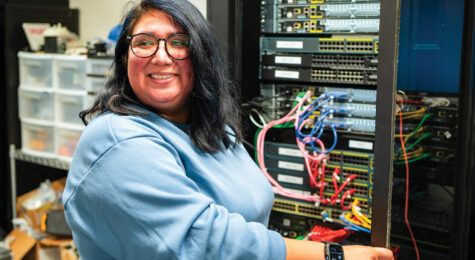Explore the Advantages of Doing Business in San Joaquin County
In Stockton and the surrounding communities, you'll find a business climate that is adaptable and collaborative.

Thinking about doing business in San Joaquin County? This Central California region has all the ingredients for a healthy business climate, making it the destination of choice for businesses looking for the perfect place to invest, grow and create jobs.
With its full talent pipeline, collaborative business community, diverse economy and a location that makes it a gateway to the world’s economy, San Joaquin County is home to businesses of all sizes, from local companies to big-name brands with global reach.
In This Article
Excellent Support and Infrastructure
The county’s advantages include the San Joaquin Partnership, a full-service economic development corporation that can help navigate projects from concept to development and support workforce development partnerships.
“San Joaquin County has the unique advantage of geography and destination proximity for major markets. As a county with access to the Delta waterways, we are able to reach global markets through the Port of Stockton, one of the largest inland water ports on the Pacific,” says Bob Gutierrez, president and CEO of the San Joaquin Partnership.
“We have a host of outlets in infrastructure – rail, intermodals, air freight, highways and waterways.” he says. Location and infrastructure remain key to the region’s appeal.
“Our railways and intermodals connect us to BNSF and Union Pacific rail lines reaching across the country. We have the Interstate 5 and 99 highways running through our county and connecting us in the heart of the valley. Stockton Airport is a fully functional cargo (Amazon Prime) and passenger air hub,” he says.
“There is a reason this region was a significant part of the Gold Rush era, and the opportunity to build upon that geography is timeless.”
Bob Gutierrez, San Joaquin Partnership
Creating Opportunities
While it maintains the energy of the California Gold Rush, San Joaquin’s business community is laser-focused on the future. As new industries emerge, the business community is quick to adapt and collaborate on ways to put themselves at the forefront of the future economy.
Businesses can choose from a variety of workforce development and training programs that are developed to meet the demands of the next generation of technology growth in industry and agriculture. The region’s affordability in housing and entertainment helps make San Joaquin County a destination for workers attracted by those career opportunities.
There are a host of exceptional programs helping to train the next generation of the workforce. Manteca Education & Training Center (METC) is doing just that along with partners in education through the Delta Sierra Adult Education Alliance.
“The Delta Sierra education alliance is a career and technical education (CTE) collaborative that has grown into partnerships that include the San Joaquin Partnership, WorkNet, County Office of Education, Delta College, Ready2Work and others that are all dedicated to advancing and expanding opportunity in our region,” Gutierrez says. “We call it a ‘stepping in and stepping up program’ because you can start at any point of education and interest in training and have the opportunity to advance.”
Leading the Economy
San Joaquin County represents diverse industries from agriculture and food processing to advanced manufacturing, AI logistics and electric vehicles. Programs like the Community Economic Resilience Fund (CERF) are making sure the county maintains its leading role in the economy.
“Through programs Like CERF and networking with brokers, the manufacturing sector and industry leaders, we are connecting to tomorrow’s industries, emerging markets and workforce development opportunities,” Gutierrez says.
CERF is a growing coalition of community organizations, government entities, educational institutions and economic development agencies working to support an equitable and sustainable economic recovery from the COVID-19 pandemic.
“Through program partnerships with iHub of San Joaquin, we are able to recruit speakers involved in innovation, technology and entrepreneurship to highlight advancements in these sectors and educate the next generation of innovation seekers to develop the next wave of products and services right here in San Joaquin County,” Gutierrez says.
Supporting Small Businesses
San Joaquin County is working hard to make sure the community is a place for small businesses to thrive alongside its booming health care, education and technology industries, despite historical disadvantages for small business owners.
“Area lending institutions favor loans for the expansion of profitable and stable businesses rather than smaller, newer and other higher risk businesses,” says Nicole Snyder, San Joaquin County’s deputy director. “A credit gap also exists in San Joaquin County … because conventional lenders prefer to lend to ‘seasoned’ banking relationships.”
To help fill that gap, the county offers small businesses an alternative for funding: the San Joaquin Revolving Loan Fund, specifically created to provide financial and technical assistance to the small business community that ultimately enhances the county’s long-term competitiveness as an attractive business environment, Snyder says.
The county also encourages early-stage and startup businesses to create a free account with the San Joaquin Small Business Development Center, a local organization that offers assistance with business plans, finances and the Revolving Loan Fund application process itself, among other resources.
In the City of Lodi, officials are working to launch the Hometown Microloan Program, which seeks to accomplish a similar goal.
Lodi has a robust economic development program for large manufacturers; however, conditions for economic growth for very small businesses were coming up short, says Astrida Trupovnieks, the city’s business development manager. The city saw any opportunity to assist by establishing a Hometown Microloan Program for the creditworthy micro businesses or startups who were not bankable by traditional lender standards, she says.
Once officially launched, the Hometown Microloan Program will provide no-fee loans with a fixed low-interest rate to Lodi-based startups or to small businesses with 10 or fewer employees. The Hometown Microloan Program in its entirety will also help applicants work through typical underwriting process complications or confusion with a relationship manager – in other words, first-time entrepreneurs won’t be discouraged to apply due to complicated processes or jargon.
According to Trupovnieks, officials are hoping that the Hometown Microloan Program will launch in 2023, but it’s not something that the city is doing for its own financial gain; it merely wants to see small businesses succeed.
“The city is not interested in making a profit. We want to provide low-cost capital which increases the chance of success for the borrower,” Trupovnieks says.
Sustainable Companies Shine
California is an environmentally friendly state, ranking No. 1 in the nation in water quality. It also has a statewide commitment of depending 100% on renewable energy by 2045.
In San Joaquin County, two companies have developed innovative sustainable initiatives that are gaining critical acclaim.
Nautilus Data Technologies is a water-born, eco-friendly data center in Stockton whose computer servers are being used in the most sustainable way possible. Most of the world’s data centers contain servers that produce escalating heat as they process information, but the water-cooling technology at Nautilus Stockton 1 Data Center allows servers to provide higher performance, ultra-efficiency and environmentally sustainable operations.
Nautilus officials say they can build a sustainable data center to any specifications within six months to a year. The water-based Nautilus data centers are cost-efficient and use 30% less power than traditional air-cooled data centers, and they provide 70% more energy-efficient cooling.
Another area business lauded for its sustainability efforts is Prologis, a real estate company that mostly invests in the construction of warehouses for companies in the logistics industry. Prologis has made strides toward solar energy and the electrification of vehicles, building the first EV truck charging hub in the country in Tracy.
The company has two locations in Tracy, and Prologis leases and maintains several warehouses throughout the San Francisco Bay Area.
– Writers Brianna Williams and Kevin Litwin contributed to this article.
Get to Know San Joaquin County
Want to learn more about living and working in San Joaquin County? Check out the latest edition of Livability San Joaquin County, California.



